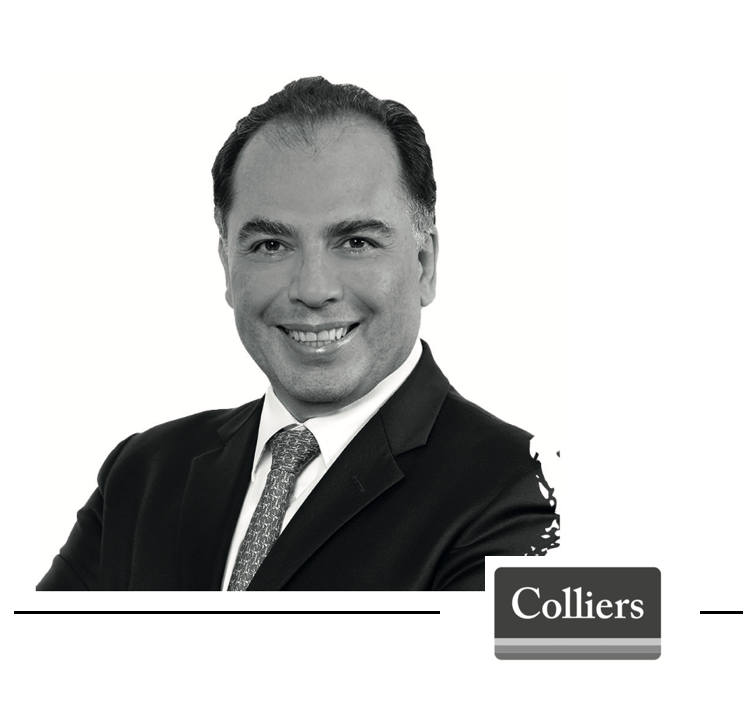By: Juan J. Gallardo
Executive Vice President, Client Solutions
COLLIERS
I finally got my Residence card in 2021. It took me 23 years since I first came to work in the USA. Up until then, I had been a Non-immigrant Alien which, other than confusing (sounded like I was an extraterrestrial), meant I could not get a long-term driver’s license, my wife could not work, my payments to Social Security and Medicare were going to waste, and my children were condemned to a non-existent path. I had not realized that, until I read the Welcome Letter that came along with the Residence Card listing its benefits. I then went to renew my driver’s license and the officer that reviewed my documents said: Welcome to the USA. You are not going to need all those immigration documents ever again!
It has been a wild interesting ride. I originally came to the US in 1998 on a temporary basis. Mexico was coming out of an ugly crisis (one of those recurrent tragedies where the currency collapses, inflation goes through the roof and everybody loses hope), when I got a visit from an old friend. He called out of the blue, saying he was going to be in town. We met 24 years earlier, at his home in Paradise, California (yes, the town that burned to the ground a few years ago). I went there as an exchange student and had the time of my life. It was a little town in Northern California, with less than 3 thousand happy and friendly people at the time. I was 12 then, about the age of Kevin Arnold, the main character of “The Wonder Years” TV series. It was the early 70 ́s and Vietnam was still ongoing. My friend ́s older sister played Cat Steven ́s music all day long. Her friends were terrified with the possibility of being sent to war. I went water skiing, ate sweet beans, and attended church services and baseball games with the family as a temporarily adopted son. That was my first real glimpse at the American society. I learned their language, heard them laugh and cry, listened to their fears and dreams, experienced their structure and discipline, and realized they were also human beings – and not TV characters – that I learned to appreciate.
I was a curiosity for them. Darker and taller than most children my age, I caught the girls’ attention. Their conception of Mexicans was based in the farm workers that crossed the border illegally, to work the fields. Kids asked me if I had seen a TV ever before, or if my parents knew what a car was. I don’t think they were ill intentioned, but it was cruel and offensive. Still, I decided not to react defensively, and soon it became a nonissue. Later in life I realized there were many versions of my country, with our own racism problems, and education and gigantic economic disparities, but at the time I believed that Mexico was me, and all Mexicans were in my same position. A year later, my friend came to visit us in Mexico. My parents took us to the country house, and we went Iguana hunting. Decades later we were still laughing when recalling my friend’s reaction as he spotted the first one. My father told us to stay low and quiet, but he yelled “Iguana papa, Iguana”, and the reptile took off. The years went by, and I had the opportunity to spend time in other places, including Buffalo, Toronto, Montreal, Paris, and Heidelberg, but of all my trips as a young man, none compared with that first one.
Life went on and I began my law degree. Right when I was studying the Mexican Constitution, the President in turn decided to violate it flagrantly, nationalizing all the banks. Mexico’s currency went from 24 to 48 pesos per dollar in one night, and eventually reached 2,890 pesos per one dollar by the end of the next administration. Inflation went rampant, workers lost their acquisition power, and most people lost their savings. I was in my third year of law school and thought to myself that the Rule of Law did not rule in my country. By then, I had already worked as an intern for a law firm, but my first assignment had been to take a briefcase full of cash to an authority, as a bribe to get a mining concession. I quit in disgust, and went to another firm, only to realize the lawyer was bribing a judge to free a gang of car thieves. I tried evicting a tenant of a property my father owned, but the tenant pulled a knife and threatened my life. I realized I did not have what it takes to be a lawyer under those conditions. Besides, the lawyer was paying me 4 thousand pesos a month, and I was spending 6K between gas and parking. Not a good business.
So, I called an uncle that worked for a multinational corporation. My uncle seemed to be an honest and hardworking man. Maybe I could emulate him. He sent me to a headhunting firm his company worked with. They received me out of courtesy, but said they only dealt with professionals with master’s and a solid background. I was still a student and had no real experience. Still, while we were talking, the executive looked at me and suddenly thought he might have something for me. A friend of his, a former banker from before the Nationalization, had to leave the private sector and went to work for the government at the Ministry of Tourism. He was looking for an Executive Assistant, and I could potentially fit the profile, because he wanted someone with no prior experience in government, young and malleable, with no “old habits” to brake. I was certainly young and came from a similar background than he did. You may fit! he said.
I went to visit his friend and had an easy and pleasant conversation. He said he felt he did not fit in the new environment and did not trust his direct reports. He was looking for loyal eyes and ears, to properly navigate the challenge. I said I was ready for the challenge, but he replied he did not have an office for the position. I said I would sit outside his office on a chair. He then said he had no idea how much the position was going to pay, but I told him I would take whatever it ended up being. To my surprise, he hired me on the spot. I started working for him immediately, and when I got my first paycheck, I realized my salary was 22 times higher than what the lawyer was paying me. I was rich! I bought a nice car, and had plenty of spare money to throw around, but the real excitement was just about to come. A former President had just died, and my boss was part of the team that took over an organism that had been created to keep him busy. It managed 33 offices around the world, marketing Mexico as a tourism destination. We were suddenly playing in a different league, with access to global marketing firms that produced costly campaigns and had representatives all over the world. That is when I fell in love with international business.
Eighteen months later, my boss left the Ministry to follow a friend that had been designated to head another large organism. He asked me to come along, but I wanted to finalize my thesis and get my law degree, to start my own practice. He promised to assign me a secretary to type my thesis and give me enough lee way to successfully conclude my studies. I reluctantly accepted, and as we settled into the new job, Mexico City endured a terrible earthquake on September 19th, 1985. I headed a group of workers to try to unearth people from a collapsed building. A horrible experience, but one to think about, regarding the frailty of life. I decided it was time to stop fooling around and get serious. I went to look for my former girlfriend and asked her to marry me, leaving her an engagement ring, but she came back a couple of weeks later, giving me the ring back, and saying I was not ready. And she was right.
I expedited getting my degree to open my law firm, leaving a well-paid job, only to realize I now had to pay a rent, electricity, secretary, phone, expenses, taxes, insurance, etc. It was an educational year. That year I made very little money, until a widow I solved an inheritance for, asked for help to sell the house she had inherited. I sold it and made more money with that, than as a lawyer the whole year. A young architect I met had gone through a similar situation, when he sold a house that a couple asked him to build and then cancelled the wedding. We traded stories over cocktails and decided to partner. He was 23 and I was 25. We formed a company and ran it for a decade, growing it across the country. We were young and fearless, and although we lacked experience and exposure, our perseverance paid off.
Success allowed me to finally marry the girl. We had two gorgeous daughters and were doing fine, until the next crisis hit: 1995, my best year in sales. I had to sell my cars, my piano, my wife’s jewelry, my stereo, my gold chain. We went broke! We were behind rent payments for months. Inflation was over 11% a month, and my credit cards were topped. My income had gone down 85% and my credit was destroyed. The End of the World, I thought, but even that would pass, and eventually I was able to come back. I finally sold a large property, and with the fee I got, I was able to renegotiate my debts and paid them out. We had just moved to another apartment when my American friend showed up. He called saying he was going to be in town and wanted to stop by. He wanted to become a Catholic priest and was on his way to a seminar. I reluctantly agreed. When he came, we carried the conversation in English, as he had forgotten his Spanish. I had not used the language for a long time but remembered enough to blame Americans for all the economic struggles Mexico had gone through since the 70s. I explained that when we met in 1973, you needed 12 pesos to buy a dollar, but that by 1996, you needed 9,000 pesos. I blamed them for the oil crises of the 70’s and the stock market crash of the 80’s, arguing that the North American Free Trade Agreement had been a secret arrangement between politicians on both sides of the border, to se- cure cheap labor for the US. My friend just sat there, patiently staring at me. He knew nothing about politics and was all about God’s love. We had not seen each other since we were 15, and 20 years later we hardly recognized each other. But he allowed me to let off steam. By the time I was finished, I realized I had spoken nonstop for two straight hours, blaming all my problems on others. As the days went by, I had to accept that not everything was to be faulted on politicians or other countries. I was to blame for my own imprudence, excessive risk-taking appetite, poor preparation, little process, too much drinking and partying, and naivety. On the other hand, I had been speaking in English for two hours, and although I was rusty, the language was still there, somewhere in my “hard drive”. I concluded that neither my friend nor the Americans were to blame for my own doings. I had been the maker of my disgrace, and it was up to me to come out of it. But how? A few months later, Lady D had died in a crash. We were the same age, and I had had a crush for her since she started her public life. But the beautiful princess did not have a happy ending, and if death had come to such a lovely person, it could come to me any time. I needed to wake up and do something radical to change my life.
Four years earlier, I had taken postgraduate studies in International Business. The lesson I remembered the most was the first few words the professor said: “Multinational Corporations are the new Feudal Lords of the world. They are more powerful than countries, not being bound by frontiers. They have a ton of money and a flexibility no country will ever have. They will consolidate into fewer and fewer players, until there are 3 or 4 of every trade”. At the time I thought he was crazy. He had never worked for a multinational corporation, and was just a “library rat”, but having witnessed what happened in Mexico after NAFTA was signed, convinced me he was right. Medium and small firms like mine were disappearing. The Big Boys had come into the market, and because I could not fight them, I realized I needed to join them. I knocked the door of an international firm in my trade, and told them I had expertise in their trade, and certain language skills. They did not even test me and three days later I was working for them. I did not know the team that was taking care of their international business had just walked out the door to form their own firm a few days earlier, and I had knocked the door at the right time.
I tried talking my partner into shutting down our firm and joining me at the new one, but he had a different financial position, and preferred to buy my shares and continue as an independent. It was not an amicable split, and he resented me for many years, for having jumped ship. He still owns the firm I sold him, but it never took off. My professor’s prediction kept coming true, and just a few weeks after my incorporation to the new firm, it merged with another one in Europe, becoming the largest in the world. They needed someone to be based in Miami, and I offered to cover the post. That is how my migrant adventure began.
Deciding to leave the country was bittersweet, but my wife and I were in our mid-30s, and our parents were in their sixties, so we thought we could get away for some time, without risking losing them. We planned to stay in the US four years, just enough for the girls to pick up the language, coming back to our country right before they became teenagers, to avoid drug and sex problems we believed to be prevalent in the USA. That is why we did not even think about getting a Green Card back then. Besides, it was the year Bill Clinton was being impeached. My guess was that the whole project was going to collapse soon, so we should enjoy the ride while it lasted.
But Clinton got away, and the show went on. We moved to Miami, where we rented a lovely house in the suburbs. I started doing business across the Americas, with some scattered trips to Europe. I was delighted, as I could never have dreamt of this with my little firm. I learned to appreciate the American way of doing business: Straight and to the point. No waste of time dancing around for hours before you start talking business. Work started and ended early. Lunches were short and without alcohol, allowing to go back afterwards, and still be productive.
Miami was a weird place. The Melting Pot of the South, they called it. My boss was European, number two from Venezuela, and the rest from Haiti, Bahamas, Spain, and the UK. There was only one American in the team, and we made her feel an alien in her own country. I was surprised at how little we needed to speak English in Miami. Spanish was spoken everywhere. There were even signs outside businesses, clarifying that they did speak English. My wife could spend weeks without needing to pronounce a word in English. Although more than 90% of students and teachers at our children’s school were Latins, the school ratings were very high, as most children were coming from private catholic schools from their respective countries. They spoke English at school, and Spanish or Portuguese at home, and were not socially ostracized because of that.
Our boy was born about a year later. Between pregnancy and our daughter’s school, my wife had very little – if any – contact with Americans. Even though she had no maids, like we used to have in Mexico, or her mother to support her, she managed to deal with everything, and was not ashamed pf doing things herself, because her friends were doing the same. I was constantly travelling because back in the late 90s, electronic connectivity was very limited across Latin America, and long-distance calls were prohibitively expensive. Besides, back then you needed to be there to get things done.
We believed life was great, but there were clouds in the air. In January 1999, the Brazilian economy collapsed, creating the Samba effect, followed by the burst of the dot-com bubble in the US, and the Argentinean Great Depression of 2001. The September 11 attacks were the final drop. Our Latin America division generated a very small percentage of the company’s global revenues, and the new owners decided to consolidate it with North America, shutting down the Latin American headquarters. The company kept ownership of the Mexico and Brazil operations, giving away the rest of the offices, no longer paying salaries and expenses. I was offered to stay in the US on a commission basis, but my visa was tied to my job description and a steady income, so I had to leave. I took a temporary job with another firm, to stay long enough for my children to finish school, but by September 2002, we were back in Mexico. This first trip lasted precisely the 4 years we had originally planned for, but our return had not been neither planned nor voluntary. We lost a small fortune between getting rid of vehicles, cancelling leases, and moving costs. The only gain we had made was an additional family member and a puppy. I thought we were never going back to the States, but 7 years later, we came back. Now my daughters got their master’s and have great jobs. They live close by and come often to visit. My son is doing a PhD in Saint Louis Missouri, and my wife and I moved to the financial district, to be closed to the office. The USA has been very generous with us. We made our lives here, so when the time came to decide, it was easy: we stayed.




